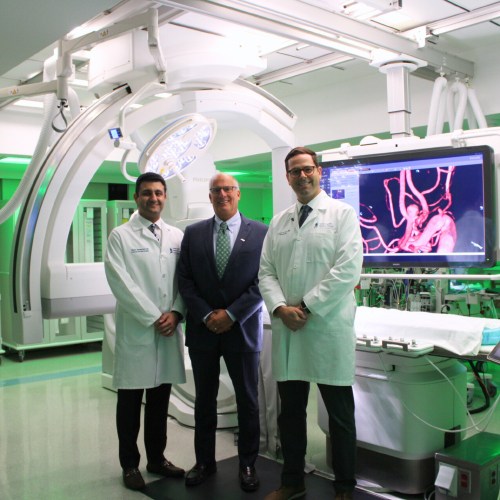
It is an honor to share that Reading Hospital has been certified as an advanced Comprehensive Stroke Center (CSC) by The Joint Commission.
We are grateful to provide our community with a Comprehensive Stroke Center that has long been recognized for excellence. Every year, our high-volume program treats more than 1,000 stroke patients. Reading Hospital has also been recognized by Healthgrades as one of America’s Top 100 Hospitals™ for stroke.
This certification, the highest and most demanding level of accreditation a stroke center can achieve, recognizes our hospital for its ability to treat the most complex stroke cases, as well as aneurysms and other serious neurological conditions.
Stroke takes the lives of roughly 170,000 people each year, and when seconds count, the outcome of a patient all depends on how and when a patient is treated. In our Comprehensive Stroke Center, we can treat all types of stroke, thanks to around-the-clock access to advanced imaging capabilities, neurointerventionists, neurosurgeons, and neuro-intensive patient care units, among others.
This eight-month comprehensive stroke accreditation process involved many helping hands and virtually every department at the hospital. I am grateful to each and every one. This achievement highlights our superior clinical quality and the exceptional skill of our team. It also recognizes how our staff members work together to meet the needs of all in our community. I would be remiss not to mention Brandon K. Root, MD, Neurological Surgery; Shahin Manoochehri, MD, Neurological Surgery; and Sarah Keller, MSN, who led this initiative and helped bring this certification to fruition.
Comprehensive Stroke Center Standards
To achieve our status as a Comprehensive Stroke Center, our team had to meet several rigorous standards, including:
- Advanced imaging capabilities are offered 24/7 for stroke care.
- An onsite rapid response team of neurologists and emergency physicians.
- Around-the-clock access to a team of neurointerventionists trained to remove blood clots from brain vessels and restore blood flow to preserve brain tissue.
- Neuroradiologists on staff provide expert interpretation of brain imaging and assist with timely treatment decisions.
- A team of vascular neurosurgeons who specialize in blood vessel abnormalities.
- Vascular surgeons treat carotid stenosis with surgical procedures, stenting, and trans-carotid stenting (TCAR).
- A dedicated neuro-intensive patient care unit to provide advanced multimodality monitoring 24/7.
- A team of neurointensivists who specialize in acute brain disorders and can treat life-threatening medical complications that are impacted by a stroke.
- A clinical team that is active in stroke research to help improve outcomes.
Stroke Warning Signs
A stroke is a serious medical emergency, and symptoms can happen quickly. We recommend using the “BE FAST” system to recognize the warning signs of a stroke:
- Balance: Sudden loss of balance.
- Eyes: Vision loss in one or both eyes.
- Face: Weakness or drooping on one side.
- Arms: Weakness in one arm.
- Speech: Slurred speech or sudden confusion.
- Time: Call 9-1-1.
Stroke and Neurology Resources
When seconds count, count on life-saving stroke care at Reading Hospital. To learn more about Reading Hospital’s Neurosciences program and the Comprehensive Stroke Center, visit towerhealth.org/neuro.
